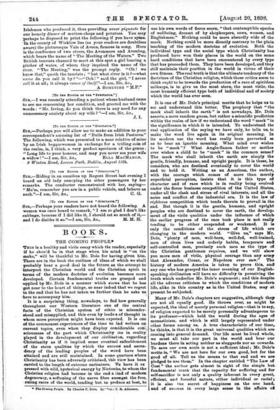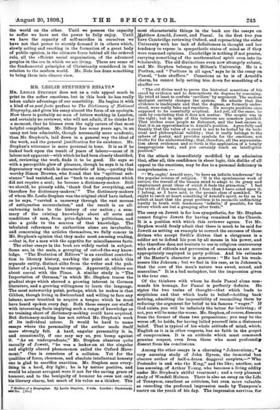BOOKS.
THE COMING PEOPLE.* 'ars is a healthy and virile essay which the reader, especially if he should be in that stage when his mind is "on the make," will be thankful to Mr. Dole for having given him. There are in the book the outlines of ideas of which we shall probably bear a good deal in the future as the attempt to interpret the Christian world and the Christian spirit in terms of the modern doctrine of evolution becomes more developed. Certain fundamental truths are grasped and -applied by Mr. Dole in a manner which siows that he has got near to the heart of things, so near indeed that we regret in the end that he has not taken us further than he asks us -here to accompany him.
It is a surprising thing, nowadays, to find how generally throughout our Western literature one of the central facts of the Christian system of ethics is misunder- stood and misapplied, and this even by leadeis of thought in whom more perception might have been expected. It is one of the commonest experiences of the time to ind writers on current topics, even when they display comiderable con:, sciousness of the part which Christianity its in reality played in the development of our civilisaton, regarding Christianity as if it implied some eventual enfeeblement of the stern qualities by which the success and ascen- dency of the leading peoples of the word have been attained and are still maintained. In some quarters where Christianity has been adversely criticised, this view has been carried to the length of extreme caricature. Ve have it ex pressed with wild, hysterical energy by Nietzsche, to whom the Christian religion had become in the end a kind of modern degeneracy, a softening of the nerve fibre attempt the free, ruling races of the world, tending but to produce at best, to • The Costing People. By Charlas F. Dole. Lc-4en: 1. B.. Alleoson.
use his own words of fierce scorn, "that contemptible species of wellbeing, dreamt of by shopkeepers, cows, women, and Englishmen." Nothing could be more absurdly wide of the mark. Nothing could be more directly contrary to the plain teaching of the modern doctrine of evolution. Both the individual type and the social type which Christianity has produced have won their places in the world on the same hard conditions that have been encountered by every type that has proceeded them. They have been developed, and they still maintain their position in the world in virtue of their own fitness. The real truth is that the ultimate tendency of the doctrines of the Christian religion, which these critics seem to think ought to be towards the production of a race of spiritless milksops, is to give us the most stern, the most virile, the most humanly efficient type both of individual and of society which the world has ever seen.
It is one of Mr. Dole's principal merits that he helps us to see and understand this better. The prophecy that "the meek shall inherit the earth" is not nowadays, Mr. Dole asserts, a mere random guess, but rather a scientific prediction within the realm of law if we understand the word "meek "in the significance in which it is intended. To understand the real application of the saying we have only, he tells us, to make the word live again in its original meaning. In its modern use the word has really been perverted as as to bear an ignoble meaning. What mind ever wishes to be " meek "? What Anglo-Saxon father or mother ever wishes a child to be " meek " in the common sense? The meek who shall inherit the earth are simply the gentle, friendly, humane, and upright people. It is these, he considers, who are destined eventually to cover the world and to hold it Writing as an American, the author, with the courage which comes of more than merely superficial perception, insists that it is this type of character and of race which is in reality being evolved under the fierce business competition of the United States, under all the clash and stress of rival interests, and all the noise and conflict of the industrial era. It is the law of righteous competition which tends therein to prevail in the end. But though it is the gentle, humane, and upright peoples who are destined to cover the earth, the develop- ment of the virile qualities under the influence of which the earlier progress of the race took place is not really tending to be either suspended or weakened. It is only the conditions of the stress of life which are changing in the modern world. "Give us," says Mr. Dole, "plenty of men, well-born, well-fed, well-trained, men of clean lives and orderly habits, temperate and self-controlled men, precisely such men as the type of the Christian gentleman requires, and we will show you more men of virile, physical courage than any army that Alexander, Omni., or Napoleon ever saw." The history of modern America is taken to prove this, and any one who has grasped the inner meaning of our English- speaking civilisation will have no difficulty in perceiving the truth which underlies Mr. Dole's argument; and this despite all the adverse criticism to which the conditions of modern life, alike in this country as in the United States, may at present be subjected.
Many of Mr. Dole's chapters are suggestive, although they are not all equally good. He throws over, as might be expected, the ideal of merely personal religion—that is to say, of religion expected to be merely personally advantageous to. its professor—which held the world during the ages of monasticism, and which is still largely represented under other forms among us. A true characteristic of our time, 'he thinks, is that it is the great universal qualities which are coming into general demand. Our life must be lived whole, we must all take our part in the world and bear our burdens there in acting neither as sluggards nor as cowards. To save our own souls is not a sufficient ideal ; Mr. Dole's motto is, "We are not here for our own good, but for the good of all. Tell us the means to that end and we are pledged to use them." In the chapter entitled "The Law of Cost" the author gets almost in sight of the simple but fundamental truth that the capacity for suffering and for self-sacrifice is not only a quality inherent in every great, efficient, and forceful nature, either individual or racial; it is also the secret of happiness on the one hand, and of success in every large sense in the affairs of
the world on the other. Until we possess the capacity to suffer we have not the power to fully enjoy. Until we have the capacity of self-sacrifice in ourselves we have not that power to sternly demand it in others which, slowly acting and reacting in the formation of a great body of public opinion, is the ultimate force behind all the ordered rule, all the efficient social organisation, of the advanced peoples in the era in which we are living. These are some of the fundamental principles of Christianity considered in its relation to the modern world. Mr. Dole has done something to bring them into clearer view.



































 Previous page
Previous page